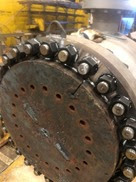Torque vs Socket Wrench: Which is better?
Torque wrenches and socket wrenches are two common types of wrenches used while operating with bolts and nuts. The uses, advantages, and disadvantages of each wrench are unique. If you don't know enough about these tools, picking one out of them can be challenging. When comparing torque and socket wrenches, which is superior? In order to assist you choose which bolting tool is ideal for your work, we will compare the torque and socket wrench in this article. For more information, let's examine each wrench separately.
Basic Use Of Torque Wrench
A torque wrench is a tool utilized to apply torque and usually acts as a torque limiter. These devices enable torque-driven machinery, such as torque screwdrivers, to convert input torque to torque output.
The equipment is employed to ensure that the transmission of torque is carried out consistently and that, to within a specific margin of accuracy, the applied torque is equal to the needed one.
Basic Use Of Socket Wrench
A socket wrench features an internal mechanism for spinning around its axis to tighten or loosen nuts or bolts by exerting rotational force at a right angle to the axis (torsion). Ratchet head and handle are its two component pieces.
You can loosen or fasten screws utilizing this bolting tool without utilizing a different hand-operated rotating instrument, such as spanners or wrenches. Additionally, some socket wrenches have longer sockets that enable them to reach deeper into spaces without needing to be held by the person using the torque wrench.
Price
It costs more to buy a torque wrench than a socket wrench. An affordable socket set can be purchased at your neighborhood hardware store or internet merchant, while a torque wrench will cost you between $200 and $400.
Calibrate
A socket wrench must be calibrated by the user, whereas a torque wrench is commonly calibrated at the factory. This is another difference between the two types of wrenches. In comparison to a socket wrench, a torque wrench is more likely to produce accurate results.
Tightening Speed
Because torque wrenches have predetermined torque settings that enable them to turn quickly without endangering delicate components like nuts and bolts, tightening screws with them typically takes less time. It takes longer to tighten screws using socket wrenches because you have to apply more torque.
Because they don't need a lot of torque and can do simple jobs quickly, socket wrenches are excellent for moving quickly. With the use of torque wrenches, you can simply modify the torque settings to prevent damage to delicate components, such as nuts and bolts, during tightening.
If you require the extra control provided by torque wrenches but still desire the speed advantages of socket wrenches, you may also select a socket wrench with an adjustable torque multiplier or torque setting.
The best course of action is to get both instruments so that they are each uniquely specialized. This will save you time by completing your work fast while avoiding harm from over tightening small parts like nuts and bolts on machinery.
Precision and Functionality
The socket wrench performs better when it comes to usefulness when adjusting screws or nuts that don't demand a lot of torque. You can manually turn it either clockwise or anticlockwise.
It is best for precision work to utilize a torque wrench, which is typically used to tighten screws or bolts to a specified amount of tension to prevent destruction or make sure that the screw operates perfectly.
Durability
The socket wrench is more resistant to wear and tear than the torque wrench. Because they are constructed of chrome vanadium or steel, socket wrenches are robust and long-lasting. The use of aluminum in the construction of torque wrenches, on the other hand, renders them more vulnerable to damage.
Overall, a torque wrench is a better option for completing jobs quickly and accurately. But if you need a more robust and user-friendly bolting tool for everyday tasks, a socket wrench is preferable.
Power and Torque
For stronger screws or bolts, a torque wrench is the best tool because it can deliver a higher preset torque to the fasteners. The torque wrench has greater strength and can produce more torque than the socket wrench.
Comfort
With their many features, torque wrenches can help you finish your task quickly and comfortably. When working long hours, comfort is of utmost importance. In comparison to a socket wrench, the torque wrench provides you with better comfort. However, using the incorrect size and kind of wrenches might wear down your hand excessively.
Conclusion
When a bolt needs to be tightly torqued with the utmost accuracy, torque wrenches are ideal. While offering a wider range of sizes and uses, socket wrenches are more adaptable. Knowing which kind of wrench to use for a project might be essential. As long as you don't need extreme accuracy, socket wrenches are fantastic!






Comments
Post a Comment